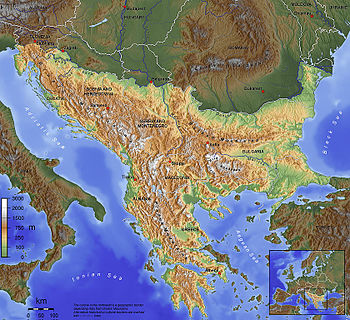Balkans
geopolitical and cultural region of Southeast Europe
The Balkans is the historic and geographic name used to describe a region of southeastern Europe.

The region has a combined area of 550000sqkm and an approximate population of 55 million people. The archaic Greek name for the Balkan Peninsula is the Peninsula of Haemus (Χερσόνησος του Αίμου, Chersónisos tou Aímou). The region takes its name from the Balkan Mountains which run through the centre of Bulgaria into eastern Serbia.
Quotes
edit- A gay peninsula filled with sprightly people who ate peppered food, drank strong liquors, wore flamboyant clothes, loved and murdered easily and had a splendid talent for starting wars".
- A Long Row of Candles by C. J. Sulzberger
- The next great European war will come out of some damned foolish thing in the Balkans.
- Attributed to Otto von Bismark by Albert Ballin, as quoted by Joachim Remak in The Origins of World War I (1967), p. 118
- In the Balkans, too, there were multiple civil wars along ethnic, religious and ideological lines [during World War II]. Yugoslavia had fallen apart in the wake of the German invasion of April 1941. Seizing the moment, the Croatian leader Ante Pavelic had pledged to side with Hitler. In the ensuing chaos, his Ustasas waged a brutal campaign of ethnic cleansing against their Serbian neighbours in Croatia and Bosnia-Hercegovina, torturing and killing hundreds of thousands of them. The populations of entire villages were packed into their churches and burned to death, or were transported to be murdered at camps like Jasenovac. Serbian Cetniks and Partisans repaid these crimes in kind. Of the million or so people who died in Yugoslavia during the war, most were killed by other Yugoslavs. This included nearly all of Bosnia's 14,000 Jews. In Greece the German occupation was the cue for bitter conflict. There, as in Yugoslavia, a three-cornered war raged - between the foreign invaders and nationalists, but also between nationalists and indigenous Communists. When Bulgaria annexed southern Dobruja from Romania, tens of thousands of people were expelled from their homes on either side of the new border.
- Niall Ferguson, The War of the World: Twentieth-Century Conflict and the Descent of the West (2006), pp. 456-457
- It is very important to send a new signal of confidence and hope that this (Montenegro, Serbia, Albania, North Macedonia, Bosnia and Herzegovina and Kosovo) accession (into the European Union) process is wanted by the EU (European Union) with great seriousness, and that it also has a realistic chance if everyone makes an effort.
- Olaf Scholz, cited in: "Scholz backs giving chance to Western Balkans on EU membership" in Aljazeera, 10 June 2022.
- In general, I am an opponent of Pan-Slavism. I do not think that we should be doing anything either in the Balkans or with the Slavs. But the West has now tipped the balance very heavily against Serbia, as if she is to blame for everything. But it's not the Serbs or Croats or Bosnians who are guilty. In Yugoslavia the problems began for the same reason as in the U.S.S.R. The communists--they had Tito, we had Lenin and Stalin--charted out arbitrary, ethnically nonsensical and historically unjustifiable internal administrative boundaries, and for years moved inhabitants from one region to another. And when--also in the period of a few days--Yugoslavia began to fall apart, the leading powers of the West, with inexplicable haste and irresponsibility, rushed to recognize these states within their artificial borders. Therefore, for the exhausting, bloody war which is today convulsing the unfortunate peoples of the former Yugoslavia, the leaders of the Western powers must share the blame with Tito. Now, attempting to somehow correct the very problem they helped to create, they essentially repeat the well-known maxim of Metternich [the backward-looking Hapsburg diplomat who dominated the post-Napoleonic Congress of Vienna in the early 19th century] for the Holy Alliance: "Intervention for the sake of making others healthy." Today the slogan is "Intervention for the sake of humanism." It is an ironic similarity! But intervention is a very dangerous thing. It is not so easy for the great powers to control the world.
- Aleksandr Solzhenitsyn, Interview With Aleksandr Solzhenitsyn on the New Russia and Ukraine (May 1994), by Paul Klebnikov, in the (9 May 1994), issue of Forbes magazine
- Rumania, Serbia, and Montenegro should be evacuated; occupied territories restored; Serbia accorded free and secure access to the sea; and the relations of the several Balkan states to one another determined by friendly counsel along historically established lines of allegiance and nationality; and international guarantees of the political and economic independence and territorial integrity of the several Balkan states should be entered into.
- Woodrow Wilson, 14 Points, 1918